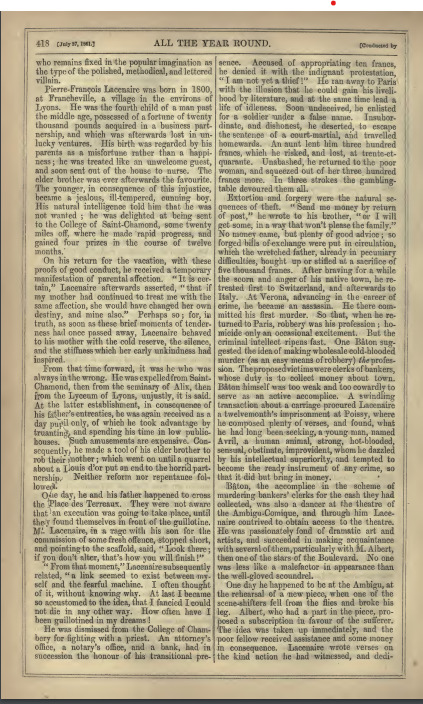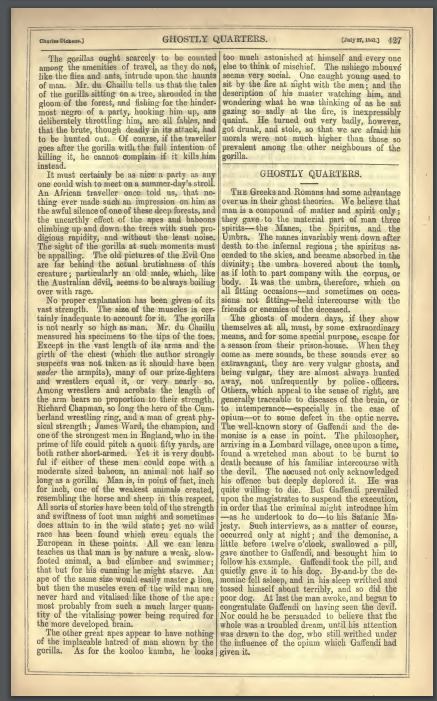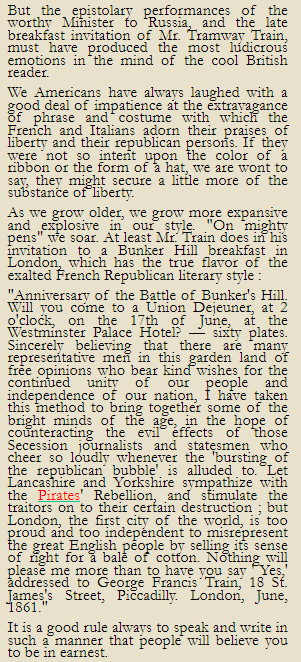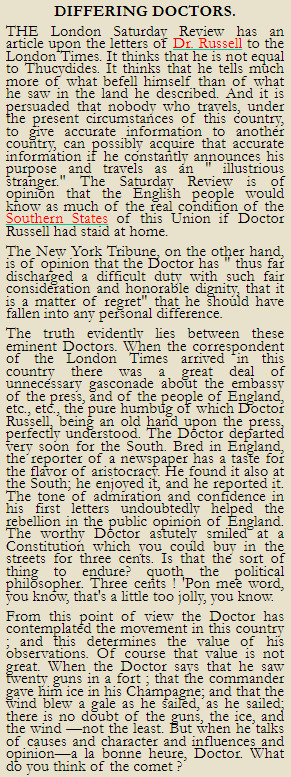Part 35
Introduction
Great Expectations by Charles Dickens was initially published as a serial in both All The Year Round, a British journal, and Harpers Weekly, an American journal. The reception was largely positive, but the other works published alongside each specific chapter offer insights into the inner workings of Victorian Society. For Chapter XVIII in Volume Three and its surrounding works, there was a significant focus on how the mind interacts with the body or, more specifically, on the loosely defined medical condition known as a nervous breakdown. The Victorian belief that the mind and body are intricately linked, and upsets of one will upset the other, so therefore, one must be mindful of both in their daily lives, is clearly revealed by the original publishing context of Chapter XVIII (Vol. 3) as well as the American belief that this has created an uptight, cool-minded society. In fact, one source argues, "the treatments they designed reflected their awareness that mind and body needed to be healed together" (Oppenheim). In reality, the treatments often were too general to provide real benefits. Despite this, there was a strong belief in the need for the healing of the mind and the refinement of overall emotions, which led to the stereotypes that Harpers Weekly exaggerated about the British.
"Lacenaire" is a complete story about a master criminal who is caught and questioned about his crimes and his life story. He quickly reveals that his parents were not pleased in the slightest when he was born, and he only experienced short moments of parental affection. In fact, he believes "that if my mother had continued to treat me with the same affection, she would have changed her own destiny, and mine also" (“Lacenaire” 418). This notion that his upbringing and parental figures affected whom he ended up as was starting to develop among doctors as well as the idea that certain predispositions were decided very early on in one's life. Many "doctors were never sure how much of a child's nervous stability or instability was decided in the womb and how much depended on life's experiences" (Oppenheim). Therefore, "Lacenaire" provides evidence to understand Pip and Joe's relationship better; while Joe was not his biological father, he still raised Pip from an extremely young age. Joe even claims that "I done what I could to keep you and Tickler in sunders, but my power were not always fully equal to my inclinations" (Dickens 489). Pip's underlying goodness stems from how Joe raised him, which is an understanding that "Lacenaire" provides the context for. Upbringing is crucial in forming both the mind and body and can ultimately shape who a person will become, whether that be a criminal or a gentleman.
Studies of mental disorders and conditions were still in their infancy during this time period, and as such, a few diagnoses were given to an extensive range of symptoms and conditions. Nervous breakdowns were one such diagnosis, but "it is an abstract concept, encompassing many symptoms that vary from one patient to another, with invariably devastating effect" (Oppenheim). "Ghostly Quarters" is another complete story in All The Year Round which features connections between the mind and the body. However, this story goes into detail about how a relatively common symptom is the appearance of ghosts, of which there are different types. Pip experiences this during his fever: "but, the vapour of a limekiln would come between me and them, disordering them all, and it was through the vapour at last that I saw two men looking at me" (Dickens 482). Through "Ghostly Quarters," we can see that the supernatural was often dismissed as tricks of the mind, whether that was due to a mental condition or a physical ailment such as fever. Some ghosts were malevolent in nature and caused by more spiritual means, but "others, which appeal to the sense of right, are generally traceable to diseases of the brain, or to an intemperance" (“Ghostly Quarters” 427). Nervous breakdowns and fevers were common causes of this particular symptom as well as grief or bereavement, as seen within Great Expectations with Pip’s illness. Therefore, Pip seeing ghosts was not a spiritual act but rather one stemming from his physical ailment.
Harpers Weekly was the American counterpart to All The Year Round and serially published Great Expectations. However, 1861 was in the middle of the American Civil War, and as such, a large amount of the focus was on the war and how it affected society. However, "Asking a Friend to Breakfast" offers insight into the differences between English and American manners, especially in regard to emotions and the mind. This article states: "London, the first city of the world, is too proud and too independent to misrepresent the great English people by selling its sense of right" (“Asking a Friend”). This opinion shows the general mindset Americans had towards the English and their overall attitudes. However, All The Year Round provides us with the insight to know that "all manner of alarmists asked whether the British people had, not merely the stamina, but the will to triumph over their rivals" (Oppenheim). So while the Americans firmly believed in the overall coolness and rigid temperaments of the English, it is actually revealed that they are still dealing with upsets of the mind and body. This hidden facet of society can further be seen in the conversation where Joe questions if he made the right decision in raising Pip: "Where is the good as you are a doing" I see the 'arm, says the man, 'But I don't see the good. I call upon you, sir, therefore to point out the good" (Dickens 490). These concerns were hidden deep within Joe's mind so that Pip was never affected by his doubts and fears.
Another clue into the American perception of English society is found in "Differing Doctors," which brings up the issue of unreliable correspondence and information and how that ends up affecting public opinion. In fact, "when the correspondent of the London Times arrived in this country, there was a great deal of unnecessary gasconade about the embassy of the press, and of the people of England" (“Differing Doctors”). As such, the Americans were basing their public opinion on the boastful claims that reporters and doctors have made. Nevertheless, in terms of this chapter of Great Expectations and its reception, the Americans likely would have found the information in regards to Pip's illness contradictory to the overall public opinion about the English. Despite this contradiction, "Differing Doctors" allows us to understand how this chapter would have been received in America and how the cultural differences would have affected reception. So the English were worried that "if the deterioration of the nervous system became part of the national inheritance, the future looked nothing short of hopeless." (Oppenheim). However, the focus of the Americans was on the Civil War and their own fight for independence, including the dire need for strong minds and the resolve to win battles no matter the cost. "Differing Doctors" also serve as a reminder that quite a few of the concerns over the mind were shared between the two countries. Resolve and strength of mind, and a strong connection with the body were crucial during the Civil War to prevent troops from lapsing into a wide variety of ailments.
Moving back to All The Year Round, we can use the context found in both the American articles and the English stories to build an understanding of Victorian beliefs about resolve, inner strength, and overall mental health. The poem "July" provides the final piece to this puzzle as it describes an idyllic and pastoral scenario where the speaker is coming to terms with the concept of endings and what lies beyond the world that we can comprehend. This is apparent in the last two lines: "my being, in a higher sense and light, / With that vast world that lies beyond our ken" (“July” 423). Drawing back to the earlier stories about the conditions that can affect the mind, including the broad condition of nervous breakdowns, this poem proves that there was much that the Victorians had yet to learn about the mind and body. The field alone was unregulated and just starting to define the connections between bodily and mental health. In the Great Expectations chapter, we see Pip regain his health primarily due to Joe's care, as it is only after he arrives that Pip stops seeing ghosts and starts to recover. Later, his desire to reconcile with Joe and Biddy settles his mind and prevents further symptoms: "my penitent remonstrance with him and there to relieve my mind and heart of that reserved" (Dickens 492). As such, the poem "July" proves that a great deal was left to learn about the mind, body, and the world itself.
Conclusion
Overall, Great Expectations by Charles Dickens was well received when it was originally published and now. However, the reveal of some of the more subtle context clues only occurs through the analysis of the published texts alongside each chapter. In Chapter XVIII in volume three, the reveal of these crucial clues about the Victorian stance on the mind and body occurs in both the English journal and the American version, Harpers Weekly. This stance largely revolved around broadly defined conditions such as nervous breakdowns and hysteria, both of which could be caused by or trigger physical ailments. However, Harpers Weekly focused more on American public opinion on English society. For Pip, in this chapter, the stress of the events he has gone through in the last weeks triggered a feverish episode where he saw ghostly figures and heard the voices of people who were not actually there. This all provides evidence that the Victorians believed that the mind and body are linked. Therefore, upsets of one will cause upsets in the other, which is clearly revealed both by this chapter of Great Expectations and its surrounding texts. In summary, the five texts published alongside this chapter of Great Expectations provide important societal contexts to understand each chapter's content properly.
Works Cited
“Asking a Friend to Breakfast.” Harpers Weekly, Harper & Brothers, Vol. 5, No.239. 1861, pp. 466
Dickens, Charles, Great Expectations, edited by Graham Law and Adrian K. Pinnington, Broadview Press, 1998
“Differing Doctors.” Harpers Weekly, Harper & Brothers, Vol. 5, No.239. 1861, pp. 466
“Ghostly Quarters.” All The Year Round, edited by Charles Dickens, Chapman & Hall, No.118, 1861, pp. 427- 432
“July.” All The Year Round, edited by Charles Dickens, Chapman & Hall, No.118, 1861, pp. 422- 423
“Lacenaire.” All The Year Round, edited by Charles Dickens, Chapman & Hall, No.118, 1861, pp. 417- 422




